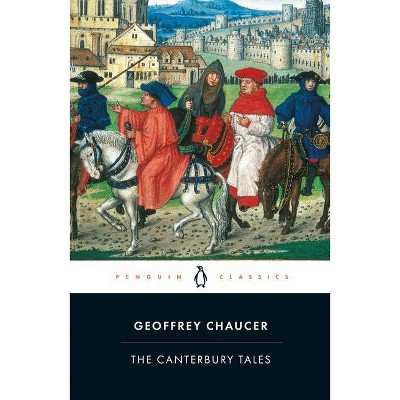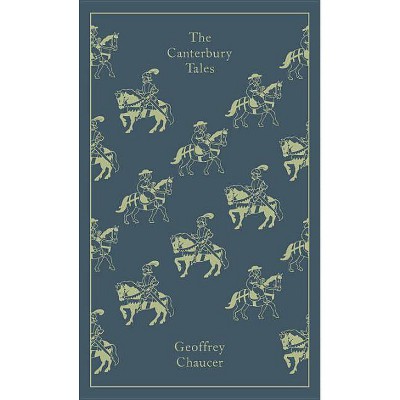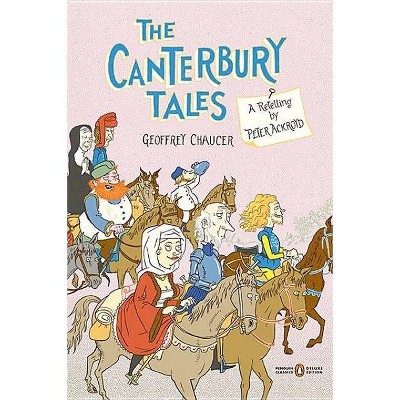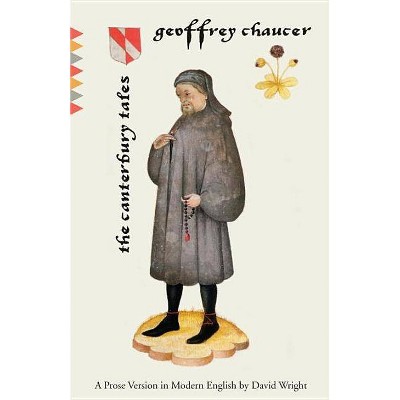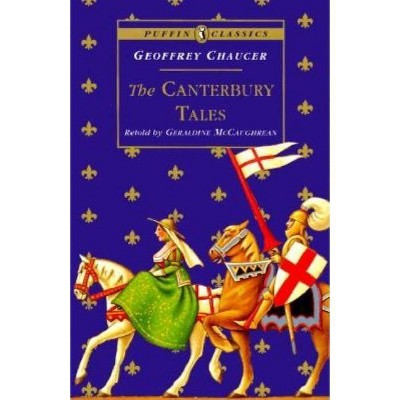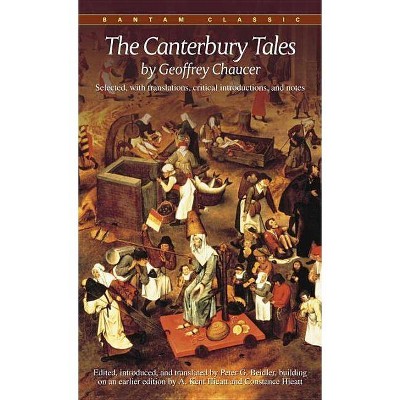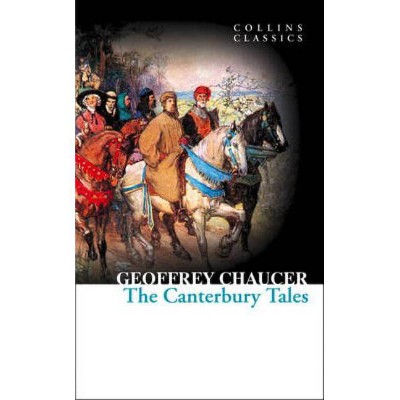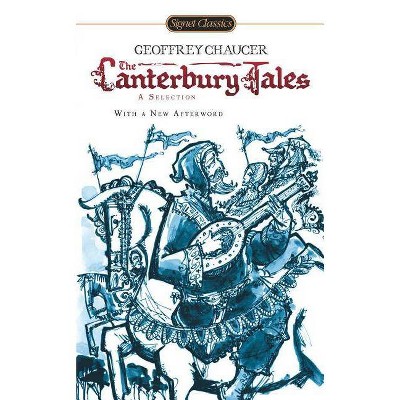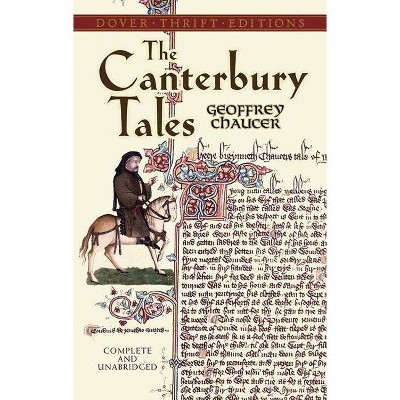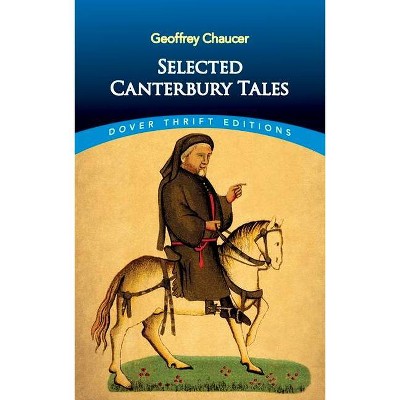The Canterbury Tales - (Penguin Classics) by Geoffrey Chaucer (Paperback)
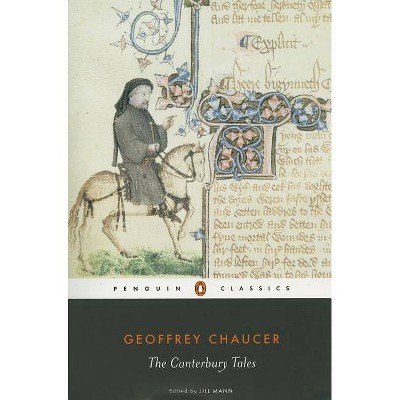
Similar Products
Products of same category from the store
AllProduct info
<p/><br></br><p><b> About the Book </b></p></br></br>The father of English literature shines in this authoritative selection from the greatest collection of narrative poems in the English language. Includes footnotes, normalized spelling, and a glossary of Middle English. Reissue.<p/><br></br><p><b> Book Synopsis </b></p></br></br><b>One of the greatest and most ambitious works in English literature, in the original Middle English</b> <p/><i>The Canterbury Tales </i>depicts a storytelling competition between pilgrims drawn from all ranks of society. The tales are as various as the pilgrims themselves, encompassing comedy, pathos, tragedy, and cynicism. The Miller and the Reeve express their mutual antagonism in a pair of comic stories combining sex and trickery; in "The Shipman's Tale," a wife sells her favors to a monk. Others draw on courtly romance and fantasy: the Knight tells of rivals competing for the love of the same woman, and the Squire describes a princess who can speak to birds. In these twenty-four tales, Chaucer displays a dazzling range of literary styles and conjures up a wonderfully vivid picture of medieval life. <p/>This is a freshly established Middle English text with standardized spelling and punctuation and on-page glossing. It Features an introduction by Jill Mann, a chronology of Chaucer's life and works, detailed explanatory notes, suggestions for further reading, a full glossary, and a bibliography. <p/> For more than sixty-five years, Penguin has been the leading publisher of classic literature in the English-speaking world. With more than 1,500 titles, Penguin Classics represents a global bookshelf of the best works throughout history and across genres and disciplines. Readers trust the series to provide authoritative texts enhanced by introductions and notes by distinguished scholars and contemporary authors, as well as up-to-date translations by award-winning translators.<p/><br></br><p><b> Review Quotes </b></p></br></br><br>"A delight . . . [Raffel's translation] provides more opportunities to savor the counterpoint of Chaucer's earthy humor against passages of piercingly beautiful lyric poetry."--<i>Kirkus Reviews<br></i><br>"Masterly . . . This new translation beckons us to make our own pilgrimage back to the very wellsprings of literature in our language." --Billy Collins <p/>"<b>The Canterbury Tales</b> has remained popular for seven centuries. It is the most approachable masterpiece of the medieval world, and Mr. Raffel's translation makes the stories even more inviting."<i>--Wall Street Journal<br></i><br><p/><br></br><p><b> About the Author </b></p></br></br><b>Geoffrey Chaucer</b> was born in London, the son of a wine-merchant, in about 1342, and as he spent his life in royal government service his career happens to be unusually well documented. By 1357 Chaucer was a page to the wife of Prince Lionel, second son of Edward III, and it was while in the prince's service that Chaucer was ransomed when captured during the English campaign in France in 1359-60. Chaucer's wife Philippa, whom he married c. 1365, was the sister of Katherine Swynford, the mistress (c. 1370) and third wife (1396) of John of Gaunt, Duke of Lancaster, whose first wife Blanche (d. 1368) is commemorated in Chaucer's ealrist major poem, <b>The Book of the Duchess</b>.From 1374 Chaucer worked as controller of customs on wool in the port of London, but between 1366 and 1378 he made a number of trips abroad on official business, including two trips to Italy in 1372-3 and 1378. The influence of Chaucer's encounter with Italian literature is felt in the poems he wrote in the late 1370's and early 1380s - <b>The House of Fame</b>, <b>The Parliament of Fowls</b> and a version of <b>The Knight's Tale</b> - and finds its fullest expression in <b>Troilus and Criseyde</b>. <p/>In 1386 Chaucer was member of parliament for Kent, but in the same year he resigned his customs post, although in 1389 he was appointed Clerk of the King's Works (resigning in 1391). After finishing <b>Troilus</b> and his translation into English prose of Boethius' <b>De consolatione philosophiae</b>, Chaucer started his <b>Legend of Good Women</b>. In the 1390s he worked on his most ambitious project, <b>The Canterbury Tales</b>, which remained unfinished at his death. In 1399 Chaucer leased a house in the precincts of Westminster Abbey but died in 1400 and was buried in the Abbey.<br><b><br>Jill Mann</b> is a fellow of the British Academy, an Honorary Fellow of St. Anne's College, Oxford, and a Life Fellow of Girton College, Cambridge.
Price History
Price Archive shows prices from various stores, lets you see history and find the cheapest. There is no actual sale on the website. For all support, inquiry and suggestion messagescommunication@pricearchive.us
